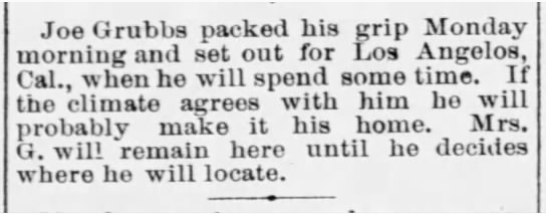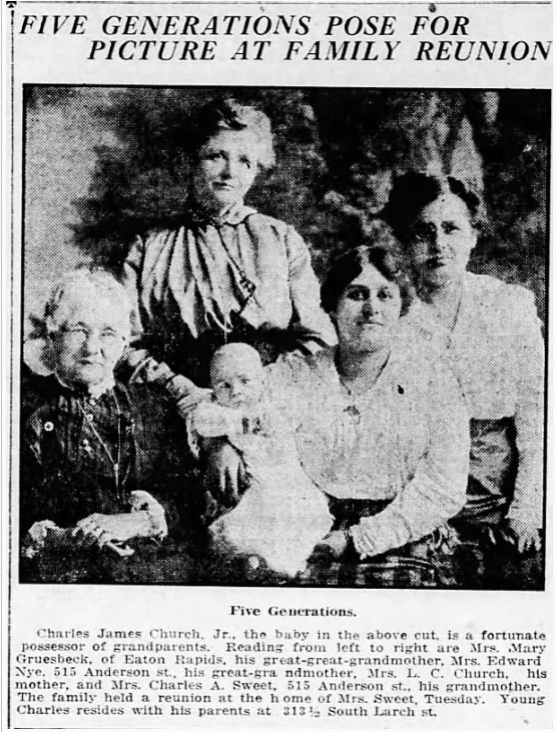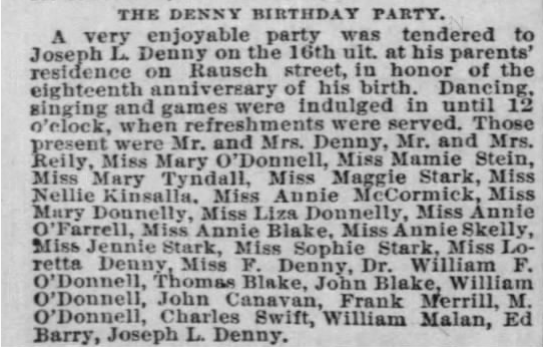Society pages in historical newspapers were the equivalent of today’s social media. They reported on social events, family news, birthday parties, anniversaries, and more! Don’t forget to explore the society pages when researching your ancestors in the newspapers. You might discover wonderful gems that provide color, context, and insight into your ancestors’ daily lives.
Society pages appeared as early as the 1830s and were prevalent in many papers by the 1880s. Your ancestor didn’t need to be famous or wealthy to appear on the society page (though that helped). Instead, newspapers reported on everyday citizens and events in their lives.
Moves and Relocations: Did your ancestors move from one state to another? You may be able to discover what prompted the relocation by reading the society pages. In this clipping, Joe Grubbs left Kansas for California in 1887, hoping to find a more agreeable climate.

Family Reunions: Society pages often reported on family reunions. In 1909, the Pierson family held a reunion in Delaware, and 325 family members attended. This article named each person and how they were related. What a treasure! Sometimes newspapers published family photographs. Check out this beautiful five-generation portrait from the Church family reunion in 1917.

Illness: If your ancestor suffered from an illness, you might discover details in the society pages.

Birthdays and Anniversaries: Society pages reported on special events like birthday parties or anniversaries. In this example, the paper recorded each guest that attended Joseph Denny’s 18th birthday party in 1887. Chances are some of the participants are other relatives, and the guest list can provide new clues for exploration.

Significant anniversaries often appeared in the society pages. The Des Moines Register regularly highlighted anniversaries for couples married over 50 years. This couple’s anniversary announcement lists the names of their children. As was common at the time, their daughters are referred to by their husbands’ names. This information provides new genealogical research clues.

These are just a few examples of what you might find in the society pages; there is much more to discover. Explore the society pages in your ancestors’ hometown papers for unique details and fun finds. Search Newspapers.com™ today!


Yupp. Only because our granny’s surname was unique did we find good ‘posts’
I have found many family entries in Society pages in their hometown and county newspapers. They weren’t famous, wealthy and their surnames were not particularly unique. These entries have certainly added color to the lives of my family members. Most of the older generations have since passed, so I treasure what I have been able to learn about who they were, what they were involved in, where they traveled and where they lived. Thank you.
The only way I was able to extend my family tree was by Newspapers around the turn of the century 1900s. It takes a lot of patience and experimentation including use of wildcard characters for mispellings/character recognition with surnames, searching street addresses, etc. As far as I can tell the findings would have otherwise been impossible without the added dimension of newspapers.
I definitely recommend checking for society page articles. I discovered my elderly, white-haired great-aunt I met only one time as a child was a noted piano teacher in her town who studied at the Cincinnati Conservatory of Music. I also found out my paternal grandmother broke her ankle in a high school girls basketball game which explained why she had to have a bone graft in later years. They lived across country, and I remember being told about the operation as a child.
The society pages are indeed a treasure trove. For years, my Dad has told the story of the time he met his Aunt Nellie, who lived in Reno and came to visit his family in Philadelphia just once, when he was a teenager – some time around 1940. Aunt Nellie, who apparently was a real character, made quite an impression on my father. Sure enough, while searching the Reno Gazette, I found a small item from the society pages, dated March 18, 1941, saying that Nellie had just returned to Reno after visiting relatives in Philadelphia. This confirmed my father’s recollection and gave us an exact date. Nellie must have been something: she married at 16, had at least three husbands, and co-owned a potato chip factory in Reno.
It is disappointing that this only covers American newspapers. There is no mention of English society pages.
Joyce
While they don’t mention the English society pages, it works the same way in England as it does in the States– with more of the society info being in the 1900s BUT have found tidbits before 1900–it just takes a lot of searching and patience–and keeping in mind that you are less likely to find a mention of an ancestor in London or a bigger city unless they had some kind of strange accident/ fire, witnessed a crime or were murdered etc….
What You need to know is the name of their kids, the person’s occupation ( usually on the census or Parish marriage info) as well as the COUNTY and ADDRESSES they lived at during the different decades which unless in a very rural area can be found on the different census–the name of the person’s business if they had one as well as the street address if possible – and WHEN they lived in the United Kingdom– for example my 3rd g-grandfather was born in Hampshire Co abt 1800–his Dad moved to London abt 1820–3rd g-grandfather moved back to Hampshire Co in 1840 and then moved to America in 1850–where as my 2nd g uncle was born outside of London– moved to America abt 1855 then moved back to London in 1876 and spent the rest of his life there BUT often travelled back to America as he had dual citizenship and businesses in both countries….
I’m only interested in UK newspapers so it looks like this subscription isn’t suitable for me.
OH Valerie– there is a LOT that can be found on newspapers.com for your ancestors in the UK
BUT it takes a lot of searching— I myself have found just short simple obits ( 1896) to very elaborate obits ( 1921) giving not only the names of the family members BUT also the name of each person who gave a floral tribute and what the message of the floral tribute said– I have found simple marriage info to very elaborate marriage info (1900)–very similar to what was recorded in the 1950s here in America– I have found where my 3rd-grandfather went to court over a rent dispute in early 1840 in London and where someone stole merchandise from his store in late 1840 in Portsea– which told me when he made the move from London to Portsea– found advertisement for his business that told me he was originally in business with a brother-in-law–all of this before 1850..
After you but the person’s name ” Charles Smith” in the search engine and the date range and then click search–on the right hand top side of page, you will see where it says UNITED STATES– this has a drop down menu that can be changed to UNITED KINGDOM and then if there are any hints, it can be changed again to England etc– after that you can pick the county or London etc BUT here is what you really need to know abt the person….
You need to know the name of their kids, the person’s occupation ( usually on the census or Parish marriage info) as well as the COUNTY and ADDRESSES they lived at during the different decades which unless in a very rural area can be found on the different census–the name of the person’s business if they had one as well as the street address if possible – and WHEN they lived in the United Kingdom– for example my 3rd g-grandfather was born in Hampshire Co abt 1800–his Dad moved to London abt 1820–3rd g-grandfather moved back to Hampshire Co in 1840 and then moved to America in 1850–where as my 2nd g uncle was born outside of London– moved to America abt 1855 then moved back to London in 1876 and spent the rest of his life there BUT often travelled back to America as he had dual citizenship and businesses in both countries….
from there, it just takes a lot of patience as well as using different variations on the surname and the first name such as Charles, Charlie, Chuck, Chas or just the initial C….
hope it helps
n
Searching through newspapers of a targeted region, using my grandmother’s married name, as ‘Mrs. Frank Vonasek’, which was a common spelling/reference practice back in the day, I stumbled upon her infamous Kolache recipe! The local paper would ask for residents/subscribers to submit copies of their most favorite recipes. Someone at the paper would then pick the “lucky” submitter’s recipe for the weekly publishing. Thus, Mrs. Frank Vonasek’s Kolache recipe appeared in ‘The Odell Oracle’ October 6, 1932. What are the odds of finding such a thing? No one in the family ever mentioned that Grandma was famous! Yes, searching through the printed society/social news circles has yielded much about my family/ancestors and enriched my genealogical research. Gotta love Newspapers.com !
Society pages are a very nice supplemental line of exploration for family history. Unfortunately even with the maximum Ancestry membership I am unable to search all of the Newspapers.com database, especially the obits (which are the primary sources of information) without the nagging demand for one more “premium” membership.
With the interlocking ownership of Ancestry.com and Newspapers.com the “one more level” requirement to access information is nothing more than a nickle and dime version of bait and switch.
I grew up in a rural community and the newspaper published in the town only came out on Thursday. My mom took over the job of correspondent for our little community, which was named for the closest one room schoolhouse. Every Sunday afternoon she sat at the phone calling all the neighbors asking for their “items”. She retired in her 80s. Her pay was a free subscription. I found an article in the same paper listing my father’s mother having attended a wedding shower and the gift she gave.
I learned when my great-grandfather sold a shipment of hogs, and when he harvested his corn, when he finally got some rain on his fields. I learned that he and his wife visited their children, and that there oldest son came to visit in Nebraska from Oregon. I learned when my grandfather purchased a machine! (a car.) Lots of fun things that really help to flesh out the story of their lives.
The Chelsea Reporter in Chelsea, Oklahoma has many articles that I personally wrote about my family and what we did. I learned lots about families in that paper. Don’t know if they are online or not. Lots of local history about Will Rogers and his family members. Used to have the original newspapers there in the office to look at. Spent lots of days there. Love finding things in the newspapers. The Booneville Democrat in Booneville, Arkansas is my go to for family too. The library in Booneville has a fantastic genealogy room. Thanks for letting us in.
Some early papers from small towns around the country, including the south, sometimes had separate society columns for local ethnic communities. Despite some regrettable column names (“Our Colored Citizens” or “From the Negro District” etc.) that effectively segregated news out of these neighborhoods from “regular” society news, they often include helpful genealogical info. I researched the life of an African American man who eventually landed in Chicago and built a career there that was mentioned in “The Defender” and also some mainline papers. Then I discovered that his hometown paper from a small Kentucky town told bits about his early life there–marriage, WWI draft & deployment, etc. Great info.
Oh my gosh– the info I have found from the society pages/local news items –info abt my much older siblings and cousins that I did NOT know such as my cousin broke her arm and my brother went to the draft board and was that very same night on a bus to the military base without Mom and Dad being notified what was going on–I found where my g-grandmother married again after her hubby died ( in between census) which I never knew because she evidently got a divorce before the next census and went back to the 1st hubby’s surname—I found where my g-grandfather after he moved to Mid Mo from another state was ( with his brother-in-law) raising and selling horses on a large scale for a living as well as being just a farmer– g-gramps was young and unmarried in 1880 so hard to find out what his life occupation was and he was murdered abt 1897–so NOT in the 1900 census– I also found out he always carried a lot of cash on his person —as far as his murder, I found several articles in Mid Mo BUT a lot across the nation with the best articles printed in his local HOME STATE newspapers which also printed info on the coroner’s inquest that was NOT mentioned anywhere else– I also discovered where a person was alive and well living in CA with her kids in the 1930s when other traditional sources suggested she had died abt 1900 in MO and so very much more ….
so there is a lot to be found– it just takes a lot of patience and looking and knowing where the family was in the different decades….